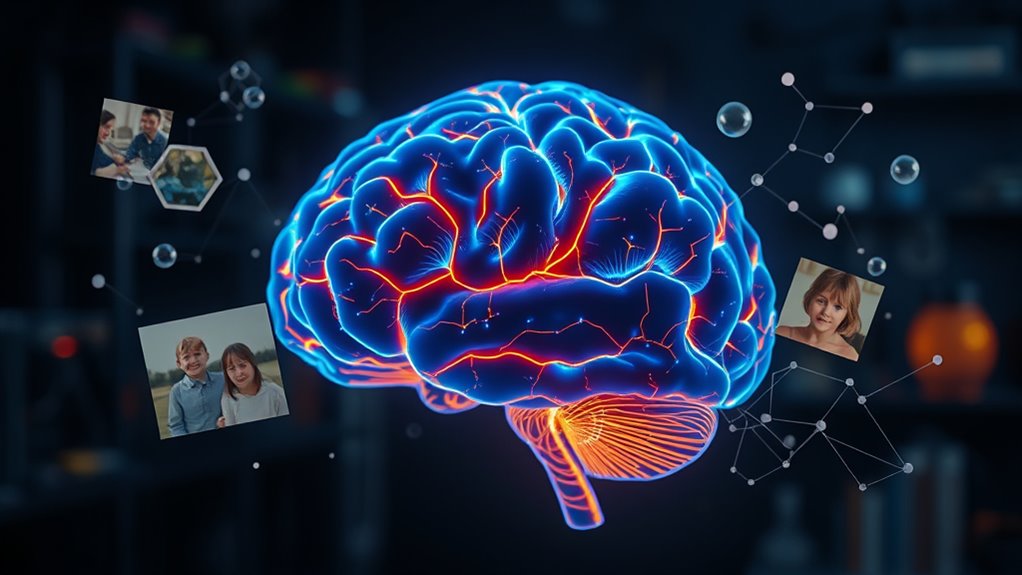You store memories through sensory, short-term, and long-term types, each with unique processes. Your brain encodes information by creating neural pathways, especially in the hippocampus, which consolidates and retrieves memories. Sleep, cues, and emotional states considerably affect recall. Factors like stress, fatigue, and aging can impair your memory. Understanding these processes helps you improve retention; continue exploring to discover effective strategies to boost your memory and recall skills.
Key Takeaways
- Memory involves encoding, consolidation, storage, and retrieval, with different types like sensory, short-term, and long-term memory.
- The hippocampus plays a central role in forming and consolidating memories through neural pathway strengthening.
- Sleep enhances memory stability by reorganizing neural connections and transferring information to long-term storage.
- Retrieval practices, cues, and emotional states significantly influence the ease and accuracy of recall.
- Lifestyle factors such as stress, sleep quality, exercise, and mental activity impact memory health and preservation.
The Different Types of Memory
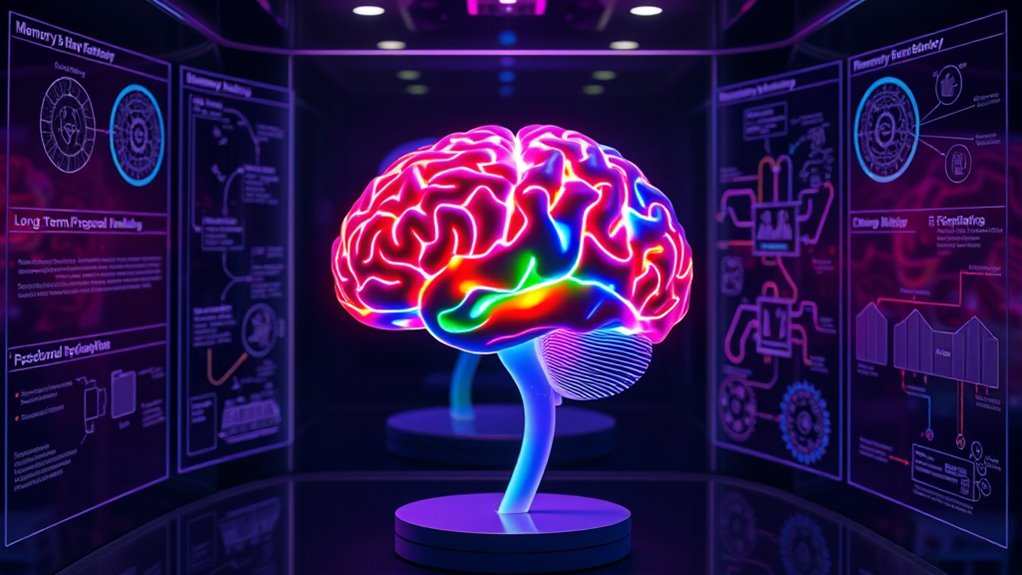
Memory isn’t just one thing; it comes in several distinct types that work together to help you learn, remember, and navigate the world. These are known as types of memory, which fall under different memory classifications. You have sensory memory, which briefly holds information from your senses, like sights and sounds, for a fraction of a second. Short-term memory, also called working memory, lets you hold onto information temporarily while you use it, such as remembering a phone number just long enough to dial it. Long-term memory stores information more permanently, including facts, experiences, and skills. Understanding these classifications helps you grasp how your brain processes and retains different kinds of information, making your memory more reliable and adaptable in everyday life. Additionally, research shows that memory techniques can significantly improve the retention of information across all memory types.
How Memories Are Encoded in the Brain
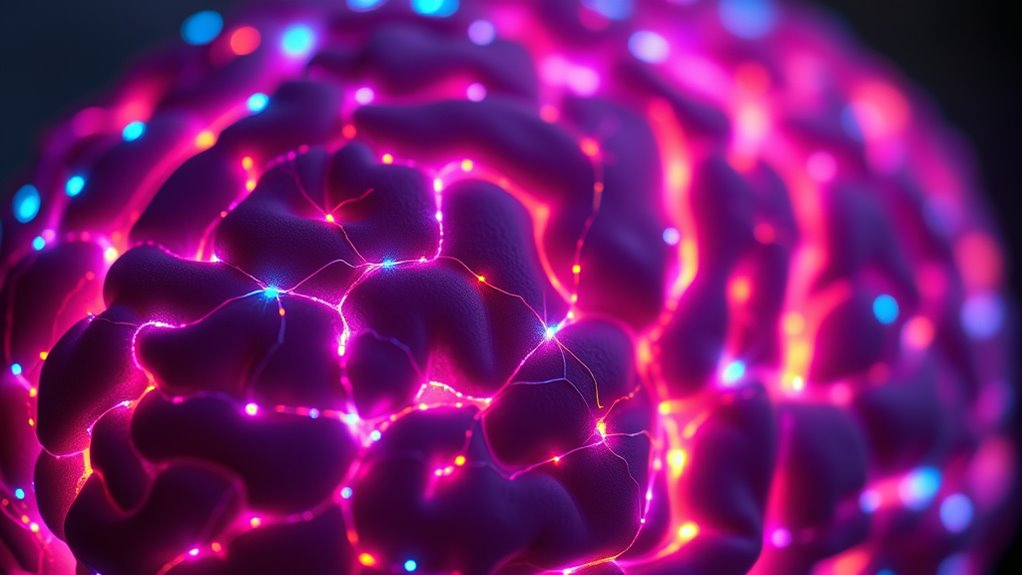
Have you ever wondered how your brain turns experiences into lasting memories? When you encounter something new, your brain begins the process of memory encoding by creating neural pathways. These pathways are connections between neurons that strengthen as you repeatedly recall or focus on the information. During encoding, your brain transforms sensory input—like sights, sounds, and feelings—into a format it can store. Different regions of your brain contribute to this process, linking relevant information together. The more you rehearse or analyze a memory, the stronger these neural pathways become, making recall easier later. Essentially, memory encoding is your brain’s way of converting fleeting experiences into durable, retrievable memories through the formation and reinforcement of neural pathways. Additionally, astrological influences are believed by some to subtly impact memory and cognitive traits, although scientific evidence remains limited.
The Role of the Hippocampus in Memory Formation
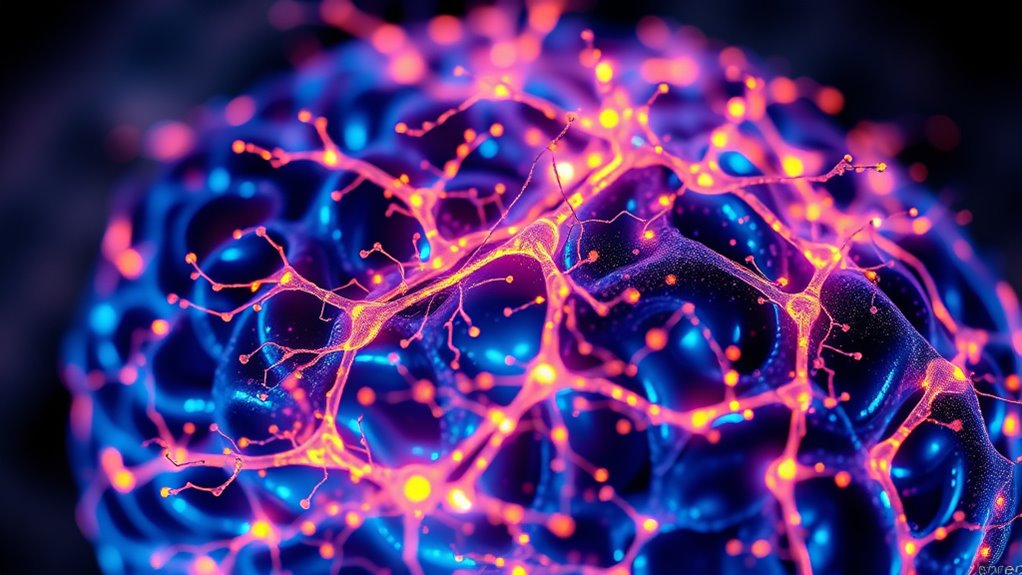
Once neural pathways are formed during encoding, a specific brain region plays a key role in consolidating and retrieving those memories—the hippocampus. This area supports hippocampal neurogenesis, the process of generating new neurons, which enhances memory stability and flexibility. The hippocampus also exhibits remarkable plasticity, allowing it to adapt and reorganize in response to learning and experience. When you recall information, the hippocampus reactivates these neural pathways, strengthening the memory trace. Its ability to modify connections enables learning and helps integrate new experiences with existing knowledge. Without this dynamic function, memories wouldn’t solidify or be accessible for future retrieval, highlighting the hippocampus’s essential role in transforming fleeting impressions into lasting memories. Additionally, the hippocampus interacts with other brain regions to facilitate complex memory processes, ensuring that both short-term and long-term memories are effectively stored and retrieved.
Short-Term vs. Long-Term Recall

Understanding the difference between short-term and long-term recall is essential for grasping how your brain processes and retains information. Short-term recall holds information briefly, usually seconds to minutes, allowing you to work with it immediately. To transfer memories into long-term storage, you might use mnemonic devices, which help encode information more effectively. Memory palaces are a powerful example—they involve visualizing familiar locations to organize and retrieve details later. Long-term recall involves the stabilization of memories over days, months, or years. While short-term recall is quick and limited, long-term recall requires effort and repetition. Recognizing this distinction helps you develop strategies, like mnemonic devices or memory palaces, to improve retention and make your memory work more efficiently. Additionally, the effectiveness of air purifiers in maintaining indoor air quality can support cognitive functions and overall mental clarity, indirectly benefiting memory retention.
The Process of Memory Consolidation
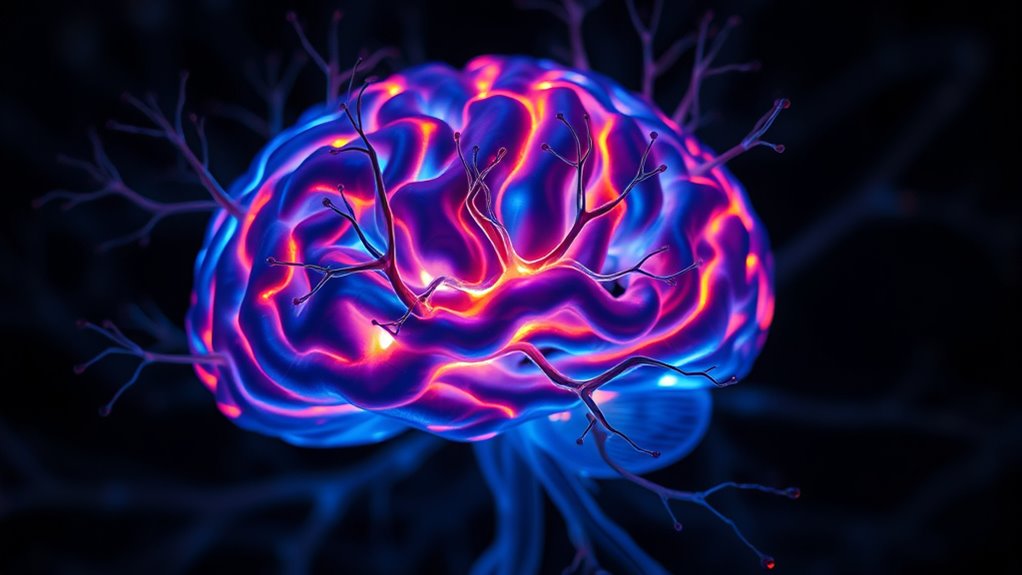
During sleep, your brain undergoes synaptic changes that strengthen memories and make them more stable. The hippocampus plays a key role in this process by transferring information to long-term storage. Understanding these mechanisms helps explain how your experiences become lasting memories. Additionally, proper sleep hygiene can enhance the efficiency of memory consolidation, leading to better recall and cognitive function.
Synaptic Changes During Sleep
Sleep plays a pivotal role in strengthening and reorganizing synaptic connections in the brain, a process essential for memory consolidation. During sleep, your brain exhibits sleep-dependent synaptic plasticity, where synapses are selectively strengthened or weakened based on prior activity. This neural reorganization during sleep helps optimize neural circuits, making memories more stable and accessible. As you cycle through different sleep stages, especially during REM and deep sleep, your brain actively refines these connections. This process not only consolidates newly acquired information but also prunes unnecessary connections, increasing efficiency. By promoting synaptic changes during sleep, your brain guarantees that important memories are preserved while reducing clutter, ultimately enhancing your ability to recall and learn new information. Discover Italian flavors and culture through this understanding of brain function and memory, enriching your journey of curiosity and learning.
Role of the Hippocampus
The hippocampus acts as the brain’s central hub for transforming short-term memories into lasting ones. Its remarkable plasticity allows it to modify and strengthen memory pathways, making recall more efficient over time. When you experience new information, the hippocampus processes and encodes these details, linking them to existing memories. During consolidation, it coordinates with other brain regions, establishing stable memory traces. This process is crucial for learning and adapting. As you revisit or rehearse information, the hippocampus reinforces these pathways, solidifying memories. Its ability to reorganize synaptic connections ensures that your brain remains flexible, capable of forming new memories or updating old ones. Without this dynamic plasticity, long-term memory formation would be severely impaired. Understanding how the hippocampus supports memory helps highlight the importance of neural plasticity in learning.
Factors That Influence Memory Retrieval

Your ability to recall memories depends heavily on factors like the context or environment where you try to remember. Your emotional state at the time can also either help or hinder your retrieval. Additionally, regularly practicing retrieval strengthens your memory, making it easier to access later. Ensuring you have a vetted understanding of effective memory techniques can further improve recall performance.
Contextual Cues Matter
When you try to recall a memory, the environment or situation you’re in can profoundly influence your ability to access that information. Contextual cues, like sensory cues and mnemonic devices, help trigger memories. For example, being in the same place where you learned something can make recall easier. Sensory cues—smells, sounds, or sights—align with stored memories, acting as powerful prompts. Mnemonic devices also utilize context to reinforce retrieval. Consider the table below, which shows different cues that boost memory:
| Cue Type | Example | Effect |
|---|---|---|
| Sensory Cues | Smelling cookies to recall baking | Trigger vivid memories |
| Environmental | Returning to a study spot | Improve recall |
| Mnemonic Devices | Acronyms and rhymes | Enhance retrieval consistency |
| Contextual Setting | Same room for studying | Reinforces memory pathways |
Focusing on these cues enhances your ability to remember effectively. Additionally, understanding the memory processes involved can help optimize your learning strategies.
Emotional State Effects
Emotional states can considerably influence how easily you retrieve memories, often acting as internal cues that either facilitate or hinder recall. When your mood matches the emotional tone of a memory—a phenomenon called mood congruence—it becomes easier to access related information. Conversely, negative emotions or poor emotional regulation can block or distort recall, making certain memories harder to retrieve. Your emotional state at the moment of retrieval plays a critical role in this process, either reinforcing or disrupting connections within your memory network. Managing emotions effectively can enhance recall by creating a more stable internal environment. Additionally, dog names and other personalized cues can serve as external triggers to aid memory retrieval. Understanding how mood and emotional regulation impact memory helps you recognize why some memories come effortlessly while others remain elusive, emphasizing the importance of emotional awareness in the retrieval process.
Retrieval Practice Benefits
Retrieval practice, the act of actively recalling information, considerably enhances memory retention and makes future recall more efficient. When you practice retrieving knowledge regularly, you strengthen neural pathways, making it easier to access that information later. Using mnemonic devices can boost this process by providing memory cues that facilitate retrieval. Incorporating spaced repetition into your study routine ensures you revisit material at ideal intervals, preventing forgetting and reinforcing learning over time. This combination of strategies helps you move information from short-term to long-term memory more effectively. By actively engaging with the material through retrieval, you not only solidify your understanding but also improve your ability to recall under exam conditions or real-life situations. Retrieval practice is a powerful tool for long-lasting learning.
Common Causes of Memory Failures

Memory failures often stem from a variety of causes that disrupt the brain’s ability to encode, store, or retrieve information effectively. One common factor is age-related decline, which can slow down neural processes and make it harder to form or recall memories. Stress-induced forgetfulness also plays a significant role; high stress levels release hormones like cortisol that impair hippocampal function, leading to difficulties in memory retrieval. Additionally, fatigue, distraction, and poor sleep quality can interfere with your brain’s ability to process memories properly. Substance abuse and certain medications may also impair memory temporarily or permanently. Recognizing these causes helps you understand why you might forget things and underscores the importance of managing stress, maintaining a healthy lifestyle, and staying mentally active.
The Impact of Aging on Memory and Recall

As you age, changes occur in your brain that can affect how well you remember and recall information. You might notice cognitive decline, which can lead to slower thinking and difficulty retrieving memories. Memory loss becomes more common, especially with complex tasks or recent events. These changes result from natural brain aging processes, like shrinking brain volume and reduced neuroplasticity. While some decline is normal, it doesn’t mean you’ll lose all your memories. Staying mentally active, exercising regularly, and maintaining a healthy diet can slow cognitive decline. Understanding these effects helps you adapt and find strategies to support your memory. Remember, aging affects everyone differently, and with awareness and effort, you can still preserve your recall abilities well into later years.
Frequently Asked Questions
Can Memory Enhancement Techniques Actually Improve Recall Accuracy?
Memory enhancement techniques like mnemonic devices and spaced repetition can definitely improve your recall accuracy. When you use mnemonic devices, you create associations that make information easier to remember. Spaced repetition involves reviewing info at increasing intervals, strengthening your memory over time. These methods actively engage your brain, making recall more efficient and reliable. So, yes, applying these techniques can genuinely boost your ability to remember things accurately.
How Do Emotions Influence Memory Formation and Recall?
Emotions influence memory formation and recall through emotional valence and mood congruence. When you experience positive or negative feelings, they shape how you encode memories, making emotionally charged events more memorable. Your mood at the time of recall also affects which memories surface, with mood congruence amplifying this effect. Emotions consequently act as filters, enhancing or hindering your ability to remember based on your current emotional state.
Are Some People Naturally Better at Memory Than Others?
You might wonder if some people are naturally better at memory. Innate abilities and genetic factors play a role, making certain individuals predisposed to stronger memory skills. These differences can influence how easily you learn and recall information. While genetics set a foundation, your experiences and practice also matter. So, some people may have an edge initially, but with effort, you can improve your own memory abilities over time.
What Are the Latest Technological Advances in Memory Research?
You’re curious about the latest advances in memory research. Neural interfaces now connect directly to the brain, allowing scientists to monitor and influence memory processes. Artificial intelligence helps analyze neural data, improving our understanding of how memories form and fade. These technologies could lead to treatments for memory loss and enhance learning. By combining neural interfaces and AI, researchers are making significant strides toward revealing the brain’s full potential.
How Does Sleep Quality Affect Memory Consolidation and Retrieval?
Isn’t it ironic how good sleep is the secret weapon for your memory? When you hit the right sleep stages, your brain consolidates memories, making retrieval smoother. But if you skimp on quality sleep, memory interference kicks in, and recall becomes a struggle. So, prioritize restful sleep, because poor sleep not only robs you of dreams but also sabotages your ability to remember what matters most.
Conclusion
Think of your memory as a vast, intricate garden, with each thought a delicate seed. When you nurture it with attention and care, it blossoms into vivid recollections. But neglect or age can let weeds of forgetfulness take over. By understanding how your mind works, you hold the key to tending this garden, ensuring your memories flourish and remain a vibrant tapestry of your life’s story. Keep cultivating your mental landscape, and your memories will thrive.
